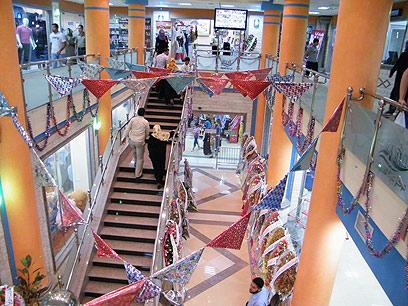
A budding middle class in the impoverished Gaza Strip is flaunting its wealth, sipping coffee at gleaming new cafes, shopping for shoes at the new tiny shopping malls, and fueling perhaps the most acrimonious grass roots resentment yet toward the ruling Hamas movement.
This middle class, which has become visible at the same time as a mini-construction boom in this blockaded territory, is celebrating its weddings in opulent halls and vacationing in newly built beach bungalows. That level of consumption may be modest by Western standards, but it's in startling contrast to the grinding poverty of most Gazans, who rely on UN food handouts to get by.
Some of the well-off are Hamas loyalists. That rankles many Gaza residents because the conservative Islamic movement gained popularity by tending to the poor — through charitable aid, education and medical care — along with its armed struggle against Israel.
"Hamas has become rich at the expense of the people," fumed a 22-year-old seamstress, Nisrine, as she stitched decorative appliqué onto a dress. She wouldn't disclose her family name, not wanting to be seen criticizing the militant group.
Gaza's Hamas government denies its loyalists have gotten wealthy since the group came to power.
Corruption "doesn't touch us," said Hamas official Yusef Rizka.
But others — even those close to Hamas — say the militant group must pay attention.
"There is a nouveau riche that has followed the rise of the government," said Alaa Araj, a former Gaza economic minister and businessman considered close to Hamas. "We must sound the alarm," he said. "(Resentment) is growing in Gaza."
Gaza residents are also resentful because they feel they have suffered the worst effects of the Israeli and Egyptian blockade that was slapped on the territory when the militant group seized power in 2007.
Some two-thirds of Gaza's 1.6 million people live in poverty and rely on UN food aid. About half the work force is unemployed. Many employed Gazans are paid miserly wages, keeping them struggling.
They include the seamstress Nisrine, who is paid $5 a day, money that her family keeps. Baker Sami Awad, 27, earns $9 a day to support his five siblings and his sister's two children. Their father abandoned them years ago; his sister's husband was killed in an Israeli incursion. Their stories are typical.
Hamas has always had a small core of prominently wealthy loyalists. But it appears another small group has seen its fortunes rise since the Hamas came to power, primarily investors and high-level civil servants in Gaza's 24,000-strong bureaucracy.
The territory also has an established middle class of old merchant families, senior aid officials and loyalists of Fatah, a Palestinian group that rivals Hamas. But there's less resentment toward them — perhaps because they are not in power.
The new signs of prosperity are due to a mini-construction boom that can be traced back to Israel's easing of the blockade it imposed on Gaza in 2007.
To circumvent the blockade, Palestinians built hundreds of underground tunnels crisscrossing the Gaza-Egypt border to bring in scarce consumer goods, as well as weapons. But after Israel started letting in more consumer goods a year ago, tunnels were freed up to bring in materials that remained severely restricted — such as raw construction materials.
The prices of raw materials dropped, sparking a flurry of construction.
Some 150 of Gaza's estimated 700 tunnels are solely used for raw materials, said two tunnel traders who requested anonymity because they dodge Hamas taxes. Some 120 tons of raw materials are typically hauled daily through a single tunnel, they said. The rush of new building materials pushed down concrete from a blockade high of $900 a ton to $157. Gravel was $990, now it's $28.
Restrictions on exports and imports make some construction projects, including factories, unfeasible. Investors are instead undertaking projects that target domestic consumers, such as the al-Andulusia mall that opened in July.
The $4 million, three-story shopping center, is a humble operation by global standards. It has a large supermarket and an assortment of clothing and shoe shops. The third floor — a future cinema — hasn't opened yet.
For many Gazans, whose lives have stalled in fighting and the blockade, the novelty is apparent.
On a recent visit to the al-Andalusia mall, two women clutched the escalator's rubber grip, giggling and shrieking as they rode up to the second floor. Another woman stared at the escalator in fright, unsure how to get on.
At another newly constructed area, parents sip coffee as their children play on swings at a specially built private play garden.
A series of small, beachside bungalows in Gaza City hug the shore where the well-off can spend summer days. Cafes and gift shops line the summer getaway. White tents are strewn on the sand. Entrance costs about $3 a person, unaffordable for most large Gaza families.
"I feel like our society has been divided," said Siham Liqtati, whose taxi driver husband earns $8 a day to support their family of six.
"There are those who are high up, and the rest of us are nothing," she lamented.
- Follow Ynetnews on Facebook
- Receive Ynetnews updates
directly to your desktop

















